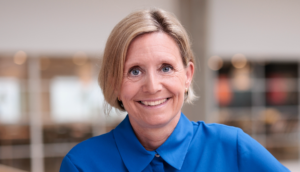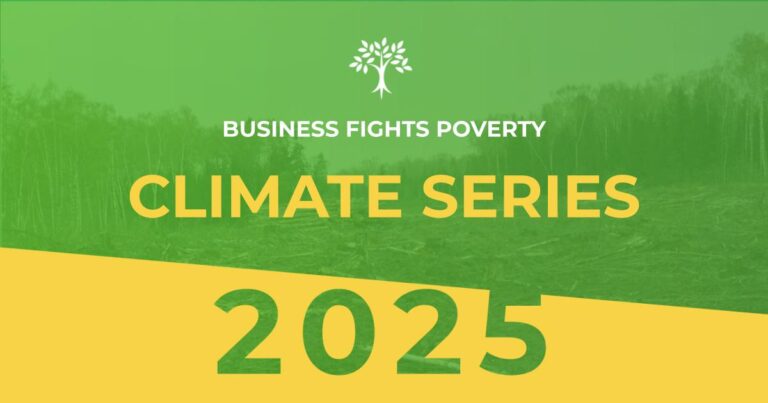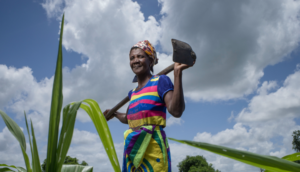Today several of the world’s largest corporations – including Hewlett Packard, SK Johnson and Unilever – are engaging with the so-called ‘bottom of the pyramid’, becoming key players in global development by selling products to improve health, nutrition and overall well-being in the rural markets of developing countries. Meanwhile development donors like DfID champion large scale social entrepreneurship as a mechanism for delivering social development outcomes, from gender empowerment, to disease eradication and access to energy.
However, the BoP model is not without its critics.
Opponents have pointed to the paradox of promoting development by increasing mass consumption, highlighting the effects of selling single serve plastic sachets of soap and shampoo in a context of global climate change.
Others claim that such initiatives are nothing more than a cynical marketing ploy on behalf of multinational corporations to ‘have their cake and eat it’ by selling products that arguably poor communities do not need but in a model that suggests a genuine concern for wellbeing and economic empowerment.
The challenge is that the boundaries between what is ‘positive’ and ‘negative’ are not always clear-cut or immediately obvious. Across the world we can find some aspects of BoP schemes that realize their claims and should supported and scaled, and we can find others that don’t.
The Centre for New Economies of Development – established by social anthropologists at the Universities of Oxford, Edinburgh and Sussex – sets out to critically engage with the claims and counter-claims made about ‘bottom of the pyramid’ approaches.
Rather than assume BoP models are either a palliative for poverty or a smokescreen for business the Centre aims to examine the distribution of gains and losses, risks and vulnerabilities in BoP markets, asking what processes of inclusion and exclusion they give rise to, and whether they can deliver development that is both ethical and sustainable.
This means exploring relationships of production, marketing, and financing, It means asking about the impact of BoP businesses on local systems of production and on the lives of entrepreneurs, workers, and consumers. And it means asking about the potentially uneven distribution of social goods mediated through markets.
For example, recent research by Catherine Dolan and colleagues at Oxford found that the Bangladesh Rural Sales Programme provides an important income-generating opportunity for some of Bangladesh’s most marginalised women – enabling them to gain some financial independence and to improve the food security of their family. However, not all women will be able to make a sustainable income from door-to-door sales. Many women will not breach purdah, which is practiced in Bangladesh, by travelling unaccompanied in rural areas, or be willing or able to spend significant amounts of time away from their families. And, although women’s earnings have increased, there may also be a ceiling effect on their income as there are obvious limits on the number of aparajitas one region can support.
Such questions are of paramount importance to development policy makers and practitioners as they champion large- and small-scale entrepreneurship as solutions to poverty.
Against a backdrop of global concern over the ethics and morality of business, the legitimacy of for-profit interventions in development will inevitably be challenged if they fail to realize claims of a double bottom line and if their benefits flow disproportionately to a small percentage of stakeholders.
* * *
The question of whether BoP approaches to development represent a new paradigm or an old paradox is the subject of a debate ‘Responsible Capitalism or Business as Usual’ to be held on Thursday May 3rd, at the Said Business School, University of Oxford. Bringing together leading champions and critics the debate will air opposing views about the opportunities and risks of BoP approaches to development. Please contact Pippa Hichensto reserve a space.
This event will also see the launch of a new website designed to promote and foster evidence-based research, the website will host informed comment, debate and analysis about BoP practices in international development and connect policy makers and practitioners to scholarship across the social sciences.
For more information, please email Catherine Dolan.
* Jamie Cross (University of Edinburgh), Catherine Dolan (University of Oxford), Dinah Rajak (University of Sussex) and Alice Street (University of Sussex)











One Response
As a Practitioner in inclusive business and Market based conservation approach with TREE AID & FAO, I think this is a very good initiative ( Centre for New Economies of Development) . BoP approach is not a ‘panacea’ for poverty and I doubt whether a any unique measure can be considered a panacea for such multifaceted challenges influenced by multiple extra & intra factors. Scheptics of BoP may have legitimate fears considering the manner with which some Practitioners portray the approach as a ‘panacea’ for poverty alleviation. It must be said that not all the people at BoP see entrepreneurship or business, what ever form it takes as a tool to come out of their situation. Many will want to be in professions like Drs, Engineers, Pilots, Nurses, Mechanics etc no matter how simplistic and unrealistic their dreams maybe at times considering their immediate environment Etc, And to those who are critical of big businesses getting into business with BoP because of ethical reasons , I don’t think they have known poverty themselves or seen real poverty. Ethics and Sustainability should be part of any form of development interventions, but giving the beneficiaries the opportunity to be part of the process from ‘square one’ , providing them with appropriate capacity to make informed decision on their ’emergence strategies’ is also very important. I will follow the progress of the Centre.